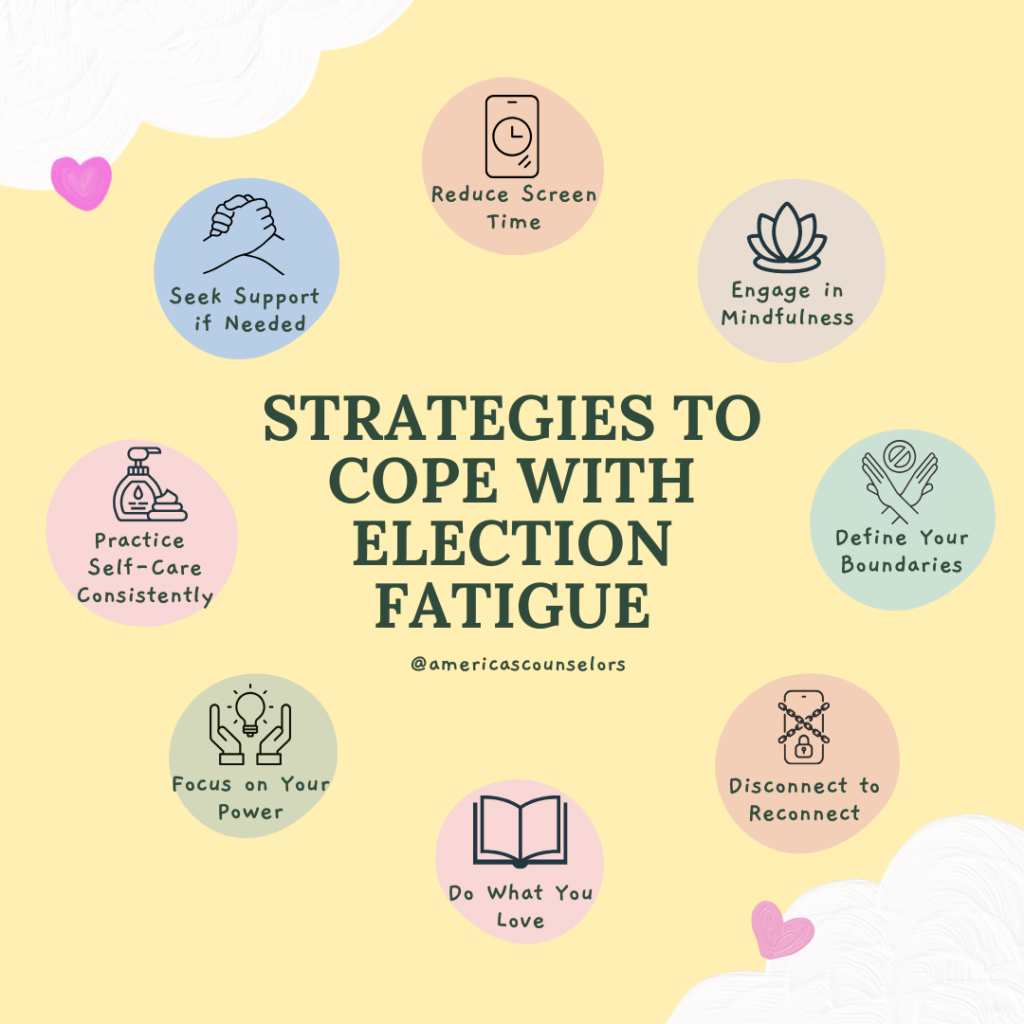
With the end of election season, and its constant barrage of media coverage, with the corresponding debates, opinions, and often heated discussions across various platforms, people can feel overwhelmed. For many people, this flood of information and heightened tension leads to a specific kind of stress known as “election fatigue.” As political ads, news reports, and social media discussions intensify, it’s easy to feel inundated and drained. This phenomenon, prevalent during election periods, can have a real impact on mental health, leaving people feeling anxious, frustrated, and, in some cases, helpless.
At our psychology therapy practice Counseling Associates of America, we recognize that election fatigue is a legitimate concern that can affect emotional and psychological well-being. Here, we will explore what election fatigue is, how it impacts individuals, and provide practical tips to manage and overcome this stress.
What Is Election Fatigue?
Election fatigue is a form of mental exhaustion that arises from prolonged exposure to political discussions, debates, and media coverage. This fatigue doesn’t stem from disinterest in politics but rather from the intensity and volume of information that often surrounds election cycles. It is characterized by feeling overwhelmed, disengaged, or apathetic towards political news, despite knowing that elections are important.
For some, election fatigue might involve feeling like every conversation or social media post is charged with political opinions, making it difficult to escape constant reminders of the political landscape. Others may experience anxiety, frustration, or a sense of helplessness, as they feel unable to influence outcomes directly.
Election fatigue affects people differently, and it’s important to recognize it as a natural reaction to an overstimulating environment. Understanding its impact can help in taking steps to manage it effectively.
The Psychological Impact of Election Fatigue
Election fatigue can have significant effects on mental health. Common symptoms may include:
Anxiety and Stress: Constant exposure to polarizing political content can increase feelings of stress and anxiety, particularly when topics are contentious.
Emotional Exhaustion: The relentless pace of election coverage can lead to emotional exhaustion, making it harder to find joy in everyday activities or focus on other responsibilities.
Sleep Disruption: Stress from political news or heated conversations can lead to difficulties in falling or staying asleep.
Social Strain: Differing political views among friends, family, or colleagues can strain relationships, increasing feelings of isolation or loneliness.
While it’s natural to be engaged in political discussions, prolonged exposure without managing stress can have lasting effects on mental health.
Strategies to Cope with Election Fatigue
Fortunately, there are ways to manage election fatigue to maintain a balanced and healthy perspective during election seasons. Here are some strategies we recommend:
1. Limit Your Media Consumption
2. Take Social Media Breaks
3. Practice Mindfulness and Grounding Techniques
4. Maintain a Healthy Routine
5. Set Boundaries in Conversations
6. Focus on What You Can Control
7. Embrace Activities That Bring You Joy
8. Seek Support if Needed
Moving Forward with a Balanced Mindset
Election seasons are naturally intense, but they don’t have to dominate your mental space. By practicing mindful media consumption, setting boundaries, and focusing on self-care, it’s possible to stay informed without becoming overwhelmed. Remember, it’s okay to prioritize your mental health during these times and to recognize when taking a step back might be beneficial.
Counseling Associates of America is here to support you during the end of election season, and beyond. If you’re struggling with election fatigue or other stressors, don’t hesitate to reach out. We’re committed to helping our community maintain mental well-being, even during the most challenging times.